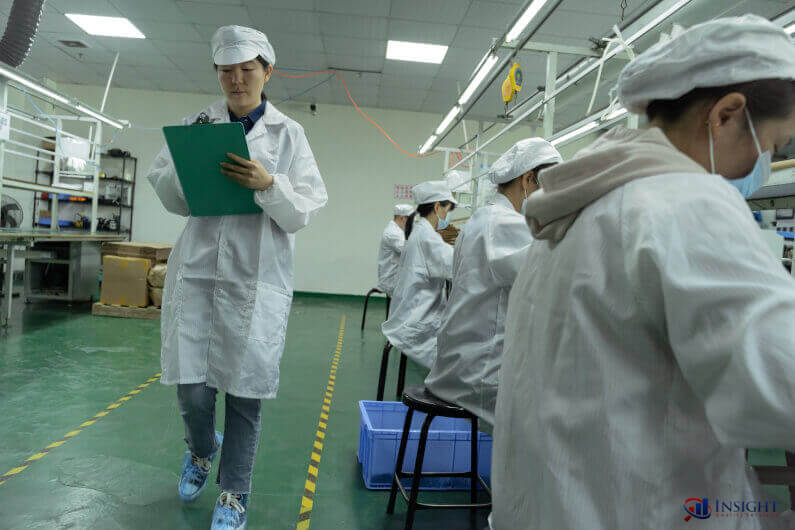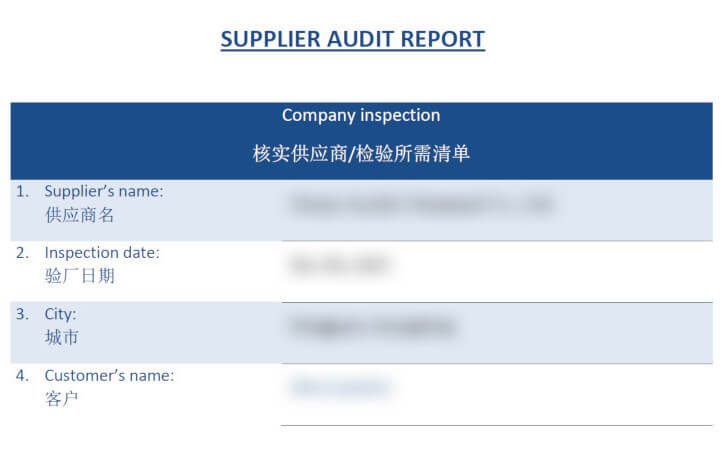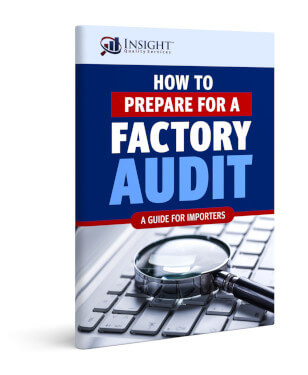When you are considering a new supplier, vetting them as thoroughly as possible is crucial. Imagine placing your first order with a factory that seems to check all the boxes. However, they delay your order by months, and when you finally receive the products, they are far below your quality standards.
Or perhaps you’ve been working with a manufacturer for several years, and they have a strong track record. You expect them to keep doing a good job and making high-quality products, but their quality slips over time despite a solid start.
A factory audit is a tool that can help you avoid these and other problems. It involves traveling to the supplier’s facility and assessing them on various criteria to determine whether they can meet your needs as a buyer. Here, we explain how factory audits work, the different types of assessments, what an audit checklist includes, and more.
Table of Contents
What is a Factory Audit?

A factory audit is a type of supplier assessment that takes place at the manufacturer’s facility. An auditor seeks out information about their current systems, capacity, workplace environment, or capabilities to ensure they meet your requirements as a buyer.
Companies often use factory audits as the last step in qualifying a potential supplier. They also use these assessments as a tool for ongoing supplier management.
Why are Factory Audits Important?
Factory audits allow you to verify that a manufacturing partner can meet your needs before you work with them. They also help you understand whether they are maintaining their capabilities over time.
You might have specific requirements for quality management, social responsibility, environmental responsibility, or production capacity. Factory audits allow you to assess suppliers to get a clear picture of what goes on in their facilities.
When Should You Conduct a Factory Audit?
Importers generally choose to audit a factory in the following two situations:
#1 As a Final Step When Qualifying New Suppliers
![]() When going through the sourcing process, you likely identify several suppliers that can manufacture your product. Then, after evaluating them in various ways and getting product samples, you narrow them down to one.
When going through the sourcing process, you likely identify several suppliers that can manufacture your product. Then, after evaluating them in various ways and getting product samples, you narrow them down to one.
That supplier may seem to meet your production, quality, and delivery requirements on paper. They may offer reasonable pricing and produce superb samples — but before you sign on the dotted line, you can conduct a factory audit to be sure they’re not misleading you.
Visiting the factory in person or hiring a third party (like Insight Quality) to provide factory audit services will help you assess their capabilities and capacity. With the information you glean, you’ll have the confidence to determine whether to place an order.
#2 As Part of Your Ongoing Supplier Quality Management
![]()
As your relationship with a supplier progresses, it’s best to ensure they maintain their capabilities and can continue meeting your expectations. You can audit them at a predetermined frequency — for example, every two years — to ensure they still meet your standards.
Auditing a manufacturer can help you identify issues in their quality management system. By proactively assessing them, you’ll have a chance to deal with problems before they impact your shipments. You can learn more about the role of factory audits in quality management here. Now, let’s talk about the different flavors of audits.
5 Types of Factory Audits
There are five types of audits that you can conduct depending on your needs. They are:
- #1 Capability audits — to help verify whether the factory can manufacture your product within the set timelines.
- #2 Quality audits — to identify whether the supplier has an effective quality management system (Based on ISO9001 standards).
- #3 Security/C-TPAT audits — to ensure compliance with U.S Customs and Border Protection’s C-TPAT program.
- #4 Social compliance audits — to assess working conditions and ensure no human rights violations occur, such as child labor (Based on the SA8000 standard).
- #5 Environmental audits — to verify whether the factory complies with environmental standards and requirements.
You can learn more about the various types of factory audits here. Before you carry out a supplier audit, developing a checklist that meets your specific needs and concerns is vital.
What Should a Factory Audit Checklist Include?

The steps in your factory audit will vary depending on the type of audit you conduct — we’ve discussed the five audit focuses above. Between the five, a quality audit is the most common, and in general, it would be divided into the following sections:
- Layout, maintenance, and cleanliness of the facility
- Quality control system documentation and practices
- Incoming materials handling and inspections
- In-process quality control procedures
- Final inspection procedures
- Packaging area and process assessment
- Non-conforming materials handling
- Communication, documentation, control, and work movement
- Handling of complaints
You can download our free factory audit checklist sample to learn more about what you should check during an audit. Now let’s talk about the difference between audits and inspections since this is often a point of confusion.
What is the Difference Between a Factory Audit and a Quality Inspection?

Here are three main differences between factory audits and quality inspections:
#1 Factory Audits Focus on the Long Term
In general, factory audits assess a potential supplier and their ability to ship high-quality goods in the long term. They focus on the ability to meet requirements and ensure product quality is maintained. On the other hand, a product inspection focuses only on the products from one particular shipment.
#2 Factory Audits Focus on the Big Picture
Factory audits cover items like quality management systems and manufacturing practices. They help you assess whether a supplier is a good fit to produce your product or look for opportunities to improve the relationship.
#3 Factory Audits Are About More Than Product Quality
One reason to conduct a factory audit can be to ensure a supplier operates above the board. A social compliance audit, for example, helps you establish whether they comply with health, environmental, and safety standards.
For more information about these differences, read our Quality Control vs. Quality Assurance article. Now, let’s go over some final thoughts.
Preparing for Your Factory Audit

When you want to qualify a new supplier or assess an existing one, a factory audit is a great tool for the job. It helps you ensure that they can meet your needs as a buyer.
You may have internal staff to conduct the audit, or you might choose to hire a third-party auditor like Insight Quality for factory audit services. If you have any questions, please contact us for more information. Either way, it is vital that you determine the right focus for the audit and put together a checklist to use at the factory.
At Insight Quality, we have conducted many audits for our clients. We’ve leveraged that knowledge and put it into a helpful factory audit guide. Whether you’re going it alone or working with a service provider, we recommend downloading the guide below to help you prepare.
Free Guide
How to Prepare for a Factory Audit
A factory audit helps you assess a supplier's systems, capacity, workplace environment, or capabilities to ensure they meet your requirements as a buyer.
But which type of audit should you conduct, and which points should you cover on your checklist? In this free guide, you'll learn how to run an effective supplier assessment.
Note: This article was originally posted on June 15, 2021 and was most recently updated in July 2023.





As an HR personnel, what are the things to consider before embarking on factory audit.
Typically, you first want to determine your main goals, since these will drive the overall focus of your audit. For example, if your primary concern is worker conditions, you may want to consider a social-compliance-focused audit.
Then, work with your auditor to develop a checklist. These audits are typically based on the SA8000 standard, so that will drive the checklist items. If you would like to conduct a social compliance or other audit, feel free to contact us at info@insight-quality.com with any specific questions or to request a quote.